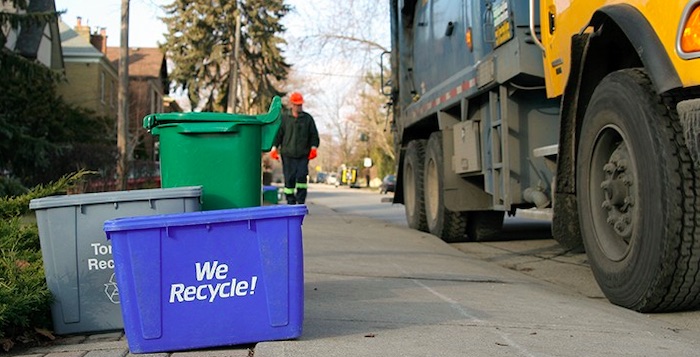
Recycling is a great way to help reduce waste, carbon emissions and the need for mining new materials. Curbside recycling programs have made it very simple to recycle from the comfort of your own home. However it’s unfortunate that many will recycle improperly.
That’s why it’s important to understand what can go in your curbside recycling bin, what can’t, and how to properly recycle items to be picked up by your curbside recycling service. We break it down for you, including what to keep in your bin, what to toss out and how to make sure all your items will be accepted in your own curbside container.
A Guide to Things That Can be Recycled at Home:
**Click to auto-scroll by section
- Intro to Curbside Recycling
- Using Curbside Recycling Containers
- What Goes in the Curbside Recycling Bin?
- Recycling Plastic in the Curbside Bin
- Recycling Paper in the Curbside Bin
- Recycling Glass in the Curbside Bin
- What Can’t Go in the Curbside Bin
- Recycling Difficult Items
- Curbside Recycling Facts & Myths
Download: Curbside Recycling Bin Cheat Sheet here.
Intro to Curbside Recycling Collection
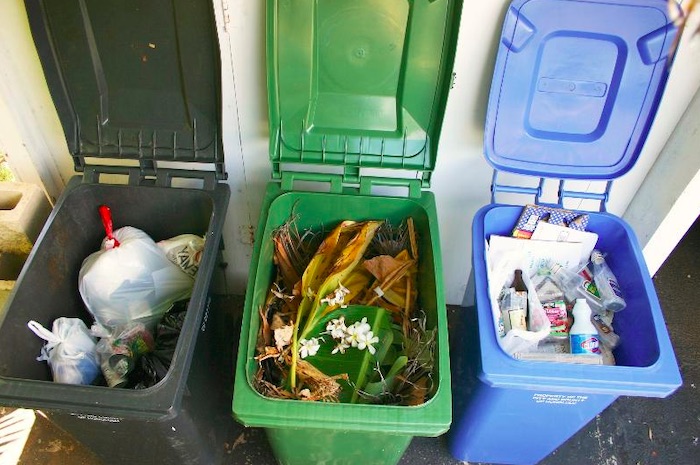
Curbside recycling is available in every single state across the country. Some states focus their efforts on mandatory recycling and landfill bands, and some focus more on their overall recycling goals. Either way, in most major cities and their surrounding areas, except for some rural areas, there is some kind of curbside recycling service available to residents.
Bulky appliance won’t fit in the bin? BOOK ONLINE ❯
Many recycling programs are offered as part of your regular curbside trash pickup service. However, there are some programs that residents can sign up for independently. Many times, states will get a grant for a special recycling program that residents can join. More and more, recycling programs are popping up across the nation, from recycling events to special pickups.
Curbside recycling usually costs between $8 and $15 a month, which is seamlessly incorporated into your trash bill. Pretty convenient, right? It is! But the money that you pay every month might not go entirely to recycling, despite your weekly efforts to toss everything into the bin and drag it down to the curb.
Using Curbside Recycling Containers
In general, most curbside recycling programs with curbside pickup service can accept the same things. Many plastic, glass, paper and metal items can easily be recycled using your curbside bin. But there also are some questions about how to properly clean items and whether or not to bag them first. Also, some things can be recycled – like furniture, appliances, and electronics – but can’t be tossed out in your curbside bin.
It’s pretty frustrating to think that after all your efforts to research what can you recycle at home, some things might get thrown in a landfill anyway. This is especially frustrating when you could have prevented it from happening in the first place.
What can’t be recycled in your curbside bin include:
- Non-recyclable items
- Recycling items placed inside plastic bags
- Food residue (a.k.a. recycling contamination)
For many years, things like plastic lids and pizza boxes weren’t able to be recycled. But recently, a lot of recycling programs have started accepting these previously “unrecyclable” items. Since this has been enstated so recently, it’s important to double-check with your recycling service before placing these items in your curbside bin on collection day.
♻️ Did you know…? One out of four items put in a recycling bin can’t actually be recycled through a curbside program, which means resources are spent on disposal instead.
Our next section deals with recycling specific items in your curbside bin. Make sure that you check with your county or local recycling service for what they do and don’t accept as part of their recycling program. Some counties don’t accept basic items like glass bottles or paper, so it’s important to be sure to check with your recycling service. This is simply a general guide and may vary depending on your location and the services available in your area.
Can’t recycle it curbside? We got you. BOOK ONLINE ❯
What Goes in the Curbside Recycling Bin?
Many household items can be recycled in your curbside bin. Most plastic bottles and containers, glass bottles and jars, paper and cans are easily recycled with the right preparation. Keep in mind, not all curbside recycling services are equal. It’s a possibility that your curbside collection service won’t accept an item that is recyclable elsewhere.
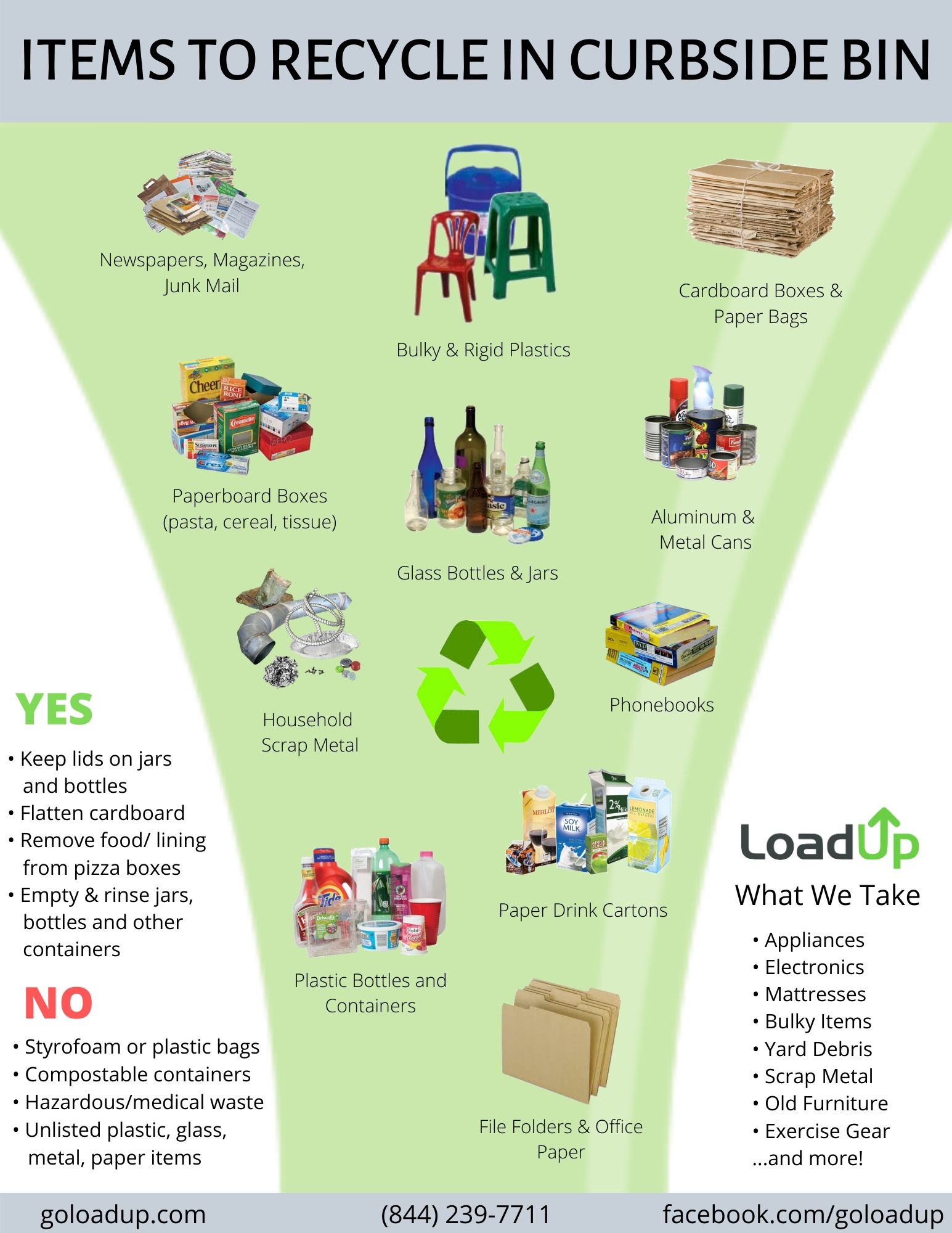
Download: Curbside Recycling Bin Cheat Sheet here.
Recycling Plastic in the Curbside Bin
Let’s talk about recycling numbers. Plastics #1-7 are usually acceptable in the curbside bin, but there are a few exceptions.
#1: PET or PETE
PET or PETE stands for polyethylene terephthalate…try to say that five times fast. #1 plastic is the most common plastic used to make single-use bottled water, soda, and other beverages. It’s cheap, lightweight and incredibly easy to recycle.
♻️ PET/PETE plastics are picked up through most curbside recycling programs.
#2: HDPE
HDPE (high-density polyethylene) is used mostly for packaging. It’s found in juice bottles, household cleaner bottles, some shopping and trash bags, yogurt and butter tubs, milk jugs and cereal box liners.
♻️ HDPE plastics are picked up through most curbside recycling programs. Some programs only allow bottles made of this plastic with necks, like milk jugs and detergent bottles.
#3: V or PVC
V (vinyl) or PVC (polyvinyl chloride) is found in shampoo bottles, piping, windows, siding and cooking oil bottles. Since PVC contains chlorine, it’s toxic when burned, making it more expensive to recycle.
♻️ V or PVC is generally not picked up through curbside recycling programs. However, it is accepted by some recycling facilities and plastic lumber manufacturers.
#4: LDPE
LDPE (low-density polyethylene) is found in frozen food containers, shopping bags, furniture, and squeezable bottles. Some of these items can be recycled, like frozen food containers and squeezable bottles, but not all curbside recycling services will accept them.
Plastic bags are not allowed in the curbside bin and should be recycled at your local grocery store.
♻️ LDPE is generally not picked up through curbside recycling programs, but some will. Please check with your county’s recycling program for more information.
#5: PP
PP (polypropylene) is mostly found in bottle caps, straws, medicine bottles, some yogurt containers, and syrup bottles.
♻️ PP plastics are picked up through most curbside recycling programs.
#6: PS
PS (polystyrene) is also known as styrofoam. Styrofoam is not accepted through all curbside programs, because it is very difficult to recycle. Polystyrene is used to make disposable dishes, egg cartons, meat trays, CD cases and aspirin bottles.
♻️ Polystyrene plastics are picked up through some curbside recycling programs.
#7: Miscellaneous
Traditionally, #7 plastics, also called polycarbonate plastics, haven’t been recycled. #7 plastics are used to manufacture DVDs, computer and iPod cases, sunglasses, nylon, certain food containers and three- and five-gallon water bottles.
♻️ Polycarbonate plastics are picked up through some curbside recycling programs.
Recycling Paper in the Curbside Bin
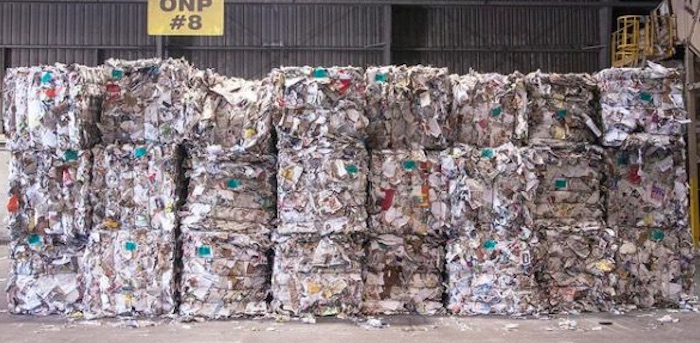
Recycling paper is super easy, but it has to be kept dry and clean of contaminants. When you put paper in your recycling bin, the best way to ensure that it doesn’t get rejected is to place it in there last so it’s on top of everything else. Once your other recyclables are clean, dry and in the bin, you can then put the paper on top and drag it all to the curb.
Shredded paper is more difficult to recycle than whole sheets, so if possible, use a black Sharpie to block out any personal information on your junk mail or other paperwork. Shredding paper reduces the fiber lengths, which makes it harder to recycle into new paper.
Not all paper is accepted in curbside bins. The general rule is that non-coated paper that easily rips goes in with the non recyclable items. Don’t place coated, heavy-weight paper in your recycling bin if you aren’t positive that your curbside service will pick it up.
📦 If you have way too much cardboard on your hands and want to get it all gone quickly, consider booking LoadUp’s efficient cardboard box recycling services near you today for a faster solution.
Recycling Glass in the Curbside Bin
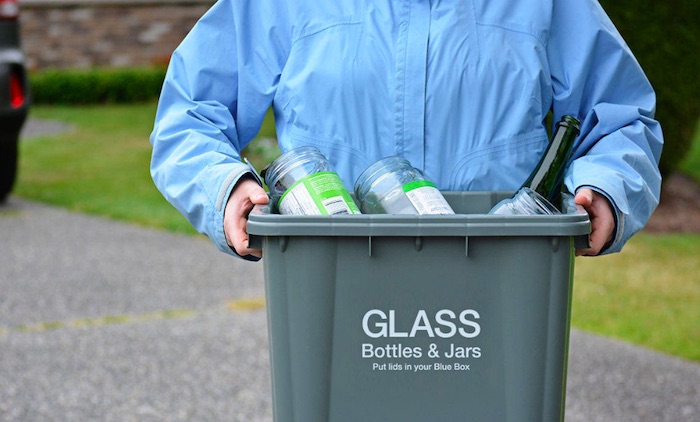
Glass is a little trickier because not all curbside collection services accept glass items in the bin. When glass breaks in your recycling bin, it becomes more difficult and dangerous to sort. Typically, broken glass – and even some intact glass items – is not recycled curbside for that very reason.
Since so many curbside recycling programs are removing glass from their list of acceptable items, it’s important to check with your county before tossing glass items in your bin.
Glass items really should be recycled. The production of glass is harmful to the environment since the process emits dangerous greenhouse gases into the atmosphere. Most recycling facilities accept glass items, but you might need to bring them to the facility and sort them by color yourself.
What Can’t Go in the Curbside Recycling Bin
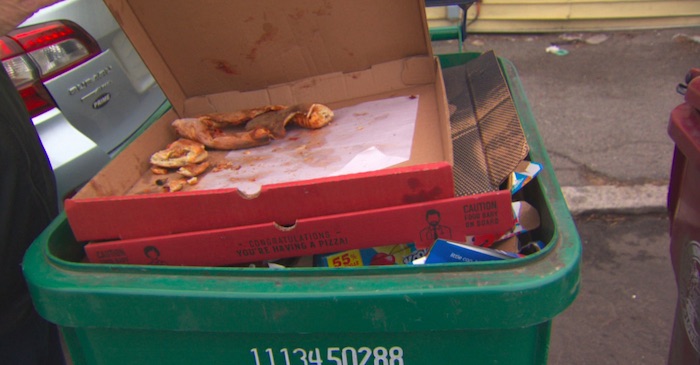
The following items should be kept out of your curbside recycling bin:
- Wire hangers
- Bowling balls
- Potato chip bags
- Propane cylinders
- Shopping bags
- Plastic wrap
- Clothing & Textiles
- Food waste
- Appliances
- Drinking glasses
- Bagged recyclables
- Hazardous materials
- Items that tangle up
- Bulky plastics**
- Wood
- Diapers
- Ceramics
- Furniture
- Batteries
- Light bulbs
- Electronics
**Some bulky plastics actually can be placed in your bin. Bulky plastics include plastic playsets, laundry baskets, and plastic furniture. Please check with your local recycling service.
Recycling Difficult Items
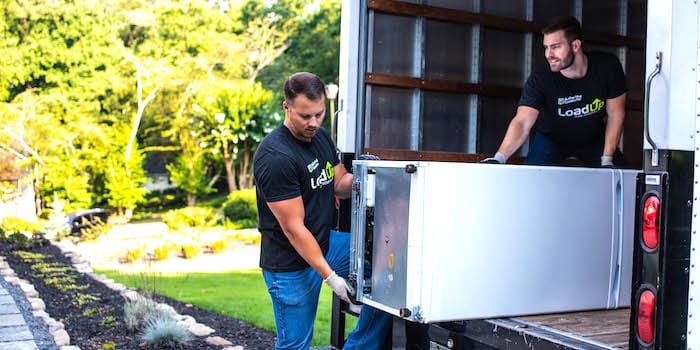
Lots of things around your house are recyclable but they can’t be placed in bins. Appliances like kitchen stoves, dishwashers and water heaters contain a lot of metal, and can easily be recycled.
You also can recycle small household appliances like microwaves, fans, and even AC units.
Furniture items like futons, bed frames, mattresses, and even some wooden furniture, are often made out of recyclable materials.
In many cases, the first step of the recycling process is actually in the form of reusing or repurposing the item. Furniture that is in good working condition is always a great candidate for donation. But if your furniture item is subpar, or not needed by a local charity, then a furniture recycler is the way to go.
Other items that can are recyclable but can’t be placed in your blue or green cart/bin include clothing, exercise equipment, and even lawnmowers!
When you have something that you want to recycle that won’t fit in your bin, you have a few different options. It’s important to note it isn’t free to recycle “hard to recycle” items. However, eco-friendly junk removal companies like LoadUp have made it much easier and more affordable than ever to have your items picked up and hauled away for eco-friendly disposal at a fair price.
Your options for recycling difficult items include:
Difficult items are a nightmare to deal with. Don’t worry, we are here to help you through this! Here are some options for getting rid of your stuff.
Haul your items to a recycling event.
Hauling your stuff can get a little bit complicated. It often requires renting a truck and the cost of gas. In addition to that, you’ll be charged for the items you bring to have recycled. If you already have a truck and don’t mind the long lines and the fees, check with your local government for the dates and locations of recycling events near you.
Request a special pickup through your recycling service.
Not every curbside recycling service offers special pickups. Make sure you clarify with them that your items are being picked up for recycling, and won’t end up in a landfill. Since so many curbside recycling services are affiliated with the local sanitation company, it’s important to make that distinction.
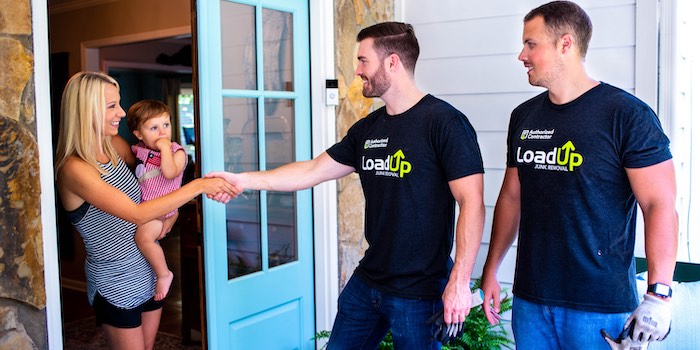
Hire an eco-friendly junk removal company.
As an eco-friendly junk removal company, LoadUp always tries to find the greenest method of disposal for all your difficult to recycle items, like furniture, appliances, mattress, treadmills and more. We make it easy to get rid of your unwanted items, with in-home and curbside pickups available. So, just because you can’t put it in the recycling cart doesn’t mean you can’t get convenient, at-home pickup.
When you hire LoadUp to remove your “hard to recycle” items, we’ll take care of everything from pickup to disposal. LoadUp takes all the guesswork out of recycling large items, making it easy and affordable to keep bulky items out of the landfill. With rates 20-30% lower than most other junk removal companies around, LoadUp is the obvious choice when you need responsible disposal of large household items at an affordable price.
Do you have large household items to recycle? Give us a call or get your upfront quote online today!
Curbside Recycling Facts & Myths
Related Articles from the Trash Talk Blog:

